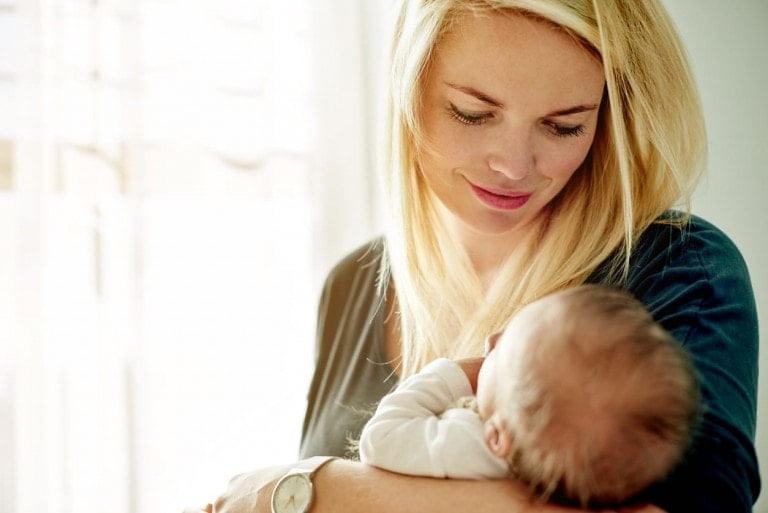Postpartum is one of the rawest and most vulnerable times in a woman’s life. Postpartum is the first three months after childbirth. Some claim it’s the first six months after birth, while others say it’s the first year. No matter how you define it, it’s a time of significant change physically, emotionally, mentally, hormonally, financially, and then some. It’s a time when women need to feel supported, cared for, and loved. I’ve shared what you can do to help a new mom during postpartum, but how can you make her feel loved? I previously covered the five love languages of pregnancy and the five love languages of labor and delivery, and today, I’m sharing the five love languages of postpartum.
First, if you haven’t read Gary Chapman’s book “The 5 Love Languages,” you can take the quiz to find out what yours is. Mine are Physical Touch and Receiving Gifts. To me, there is nothing better than a hug from a loved one, receiving a flower picked from my son, or a love note from my husband. Those are little things that make my day and make me feel deeply loved.
What Are the 5 Love Languages?
- Words of Affirmation: Love is shown through written and spoken words of affection, compliments, words of appreciation, verbal encouragement, and praise.
- Acts of Service: For people who believe actions speak louder than words. When you like to be shown how you’re appreciated and want someone to go out of their way to show you they love you.
- Receiving Gifts: You feel loved when people give you visual symbols of love. It’s not about the monetary value of the gift but the symbolic thought behind the item.
- Quality Time: Expressing your love by giving your undivided attention to someone without distractions.
- Physical Touch: People who communicate their love and appreciation through this language, when they consent to it, feel appreciated when they are hugged, kissed, or cuddled. They value the feeling of warmth and comfort that comes with physical touch.
How to Use the 5 Love Languages During Postpartum
Here’s what you can do to show your love to a new mom by looking at the five love languages of postpartum.
1. Words of Affirmation
After a woman gives birth, many things go through her mind and happen to her body. It’s an incredible time as she bonds with her newborn, but it is also an overwhelming time as she learns how to care for her baby and heal from childbirth. Postpartum can be incredibly isolating. And with her hormones plummeting after giving birth, baby blues could set in. This is the time, more than ever, that she needs your support and wants to feel your love. If her primary love language is words of affirmation, here are some things to say to her to make her feel loved:
- I love you.
- You are doing an amazing job.
- Our baby is so lucky to have you as their mother.
- I’m so proud of you.
- I couldn’t ask for a better partner.
- You’re a great mom.
- I really appreciate you and all that you do.
- Thank you for taking such good care of our baby.
- Thank you for taking such good care of our family.
- You are doing so much for our family. I see and appreciate all of your hard work.
- Thank you for all that you’ve sacrificed for our family.
- I’m always here for you.
- I love you and appreciate you even more now.
- You are beautiful.
- More postpartum affirmations
You can tell her these in person, in handwritten notes, or text messages. Knowing that she has your love and support will help build her up and encourage her throughout the day and night.
2. Acts of Service
When you have a baby, you will be shocked by how little you will get done throughout the day besides caring for your baby. A new mother will feel like she is constantly feeding, changing, or soothing the baby. Finding time to rest, eat something nourishing, or shower can be challenging when a newborn demands care morning, noon, and night. A great way to show that you really care and love her is to step up and do something. This will make her so happy and feel like she doesn’t have to do everything now that the baby is here. Whether you are her partner, a friend, or a family member, there are things that you can do that will show her that you love her. Here are some ideas:
- Bring her a cup of coffee or tea (whatever her preference is)
- Prepare and bring her healthy snacks for her to graze on throughout the day
- Make sure that her water bottle is full so that she can stay hydrated
- Help with household chores:
- cleaning the dishes
- emptying the dishwasher
- cleaning the house
- taking out the trash and diaper pail trash
- doing the laundry – including washing, drying, hanging, and folding
- washing the sheets
- making her bed with fresh linens
- Watch the baby so that she can take a shower or a nap between feedings
- If she is pumping or formula feeding, offer to help with feedings during the day and/or night
- Take care of the older kids so she can focus on the new baby
- Help with as many diaper changes as possible so she doesn’t have to do them
- Help with burping the baby after feedings
- Try to soothe the baby if the baby has already eaten and mom wants a break
- Fill her car up with gas
- Go grocery shopping for her and fill the fridge and freezer
- Bring her food in bed and clean up the dishes afterward
- More ways dads/partners can help a new mom
3. Receiving Gifts
It’s not about the monetary value. What makes receiving a gift special is knowing that person put in the time, effort, and thought behind it to get it for you. After giving birth, a woman can have difficulty adapting to her new body and life. Showing your love by gifting her a little self-care or a physical reminder of how much she means to you could mean the world to her. As a love language of postpartum, some good new mom gift ideas to get her are:
- A spa treatment
- massage
- manicure and/or pedicure
- facial
- Fresh flowers
- Delicious chocolates or her favorite candies
- A gift card for a postpartum doula or a night nanny
- A push present
- Weekly meal delivery service that brings her fresh meals
- A framed picture of her and the new baby
- Hire a house cleaning service to clean her house
- A new nursing pajama set
- A pretty, new water bottle for her to keep by her side
- Buy her favorite snacks
- Surprise her with lunch from her favorite restaurant
- Surprise her with other little gifts around the house:
- Love notes on her bathroom mirror
- A new candle by her bedside
- Books (if she likes reading)
- New slippers by her bedside
- A handwritten card that expresses your appreciation and love for her
4. Quality Time
When a newborn is in the house, finding opportunities for quality time with your partner, friends, and family can be challenging. The new mother will feel like all her time is being spent taking care of the baby, trying to get sleep whenever possible, and doing a few chores when she has the energy. When you have kids, it’s difficult to have alone time. Parents often have to be creative and flexible when spending quality time together. What she really craves is your undivided attention without distractions, good conversation, and one-on-one time with you. If her primary love language is quality time, here are some ideas that you can do postpartum:
- Ask about paternity/family leave and take it — it will mean everything to her that you can spend more time with your family during this very vulnerable and important time
- Create home dates
- make her a nice dinner and help with the baby while she is eating
- pick up food from one of her favorite restaurants and rent a movie as you watch the film while the baby lies on your chest
- Stay awake with her when she is up with the baby (and offer to help or bring her water)
- Go on a walk together with the baby by either babywearing or using the stroller
- Offer to help with a chore that she is doing so that you can do it together
- Have designated no-phone time
- Go to bed at the same time
- Ask her how she is doing, look into her eyes, and ask how you can help more
- Run errands together
- When you are back at work, call during your lunch break
Quality time can also mean that you give her the time to meet up with friends. Have her run out to grab a cup of coffee or have a girls’ night. Encouraging her that she doesn’t always have to be “mom” and can have time away for herself and friends can recharge her.
5. Physical Touch
Physical touch may seem like the last thing she wants postpartum. Sex is usually the furthest thing on a postpartum woman’s mind, but physical touch usually means a non-sexual connection. Use your body language instead of verbal or written to show her that you love her. As a reminder to partners, it is not recommended or encouraged for her to have intercourse the first six weeks postpartum. The little acts of physical touch can really warm her heart the most.
- Cuddle on the couch or in bed
- Hold her hand when you’re driving or walking together
- Rub her feet or shoulders while she is nursing the baby
- Kiss her on the forehead, cheek, on her hand
- Slow dance with her to a favorite song
- Give her good, meaningful hugs throughout the day — not side hugs, lightly hugging her, or a quick pat on the back
- Sit close to her next to the couch
- Respect that she might feel touched out
- Take a shower or bath together
Little things like this can make her feel that she is still attractive, desirable, and wanted after giving birth.
With each passing day, you should see the new mother gain more confidence in herself and her mothering abilities. In time, if you notice that she is not acting like herself even after showing her your affection using the five love languages of postpartum, sit down and talk to her. Listen to her. And encourage her to ask for help. Postpartum anxiety and postpartum depression shouldn’t be dealt with alone. Have her talk to her doctor for more information and help. The postpartum time can be very challenging for the whole family, and she should be supported as she discovers her new normal.






























